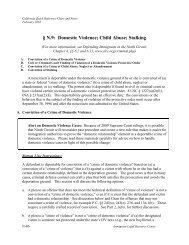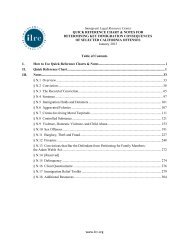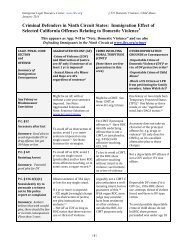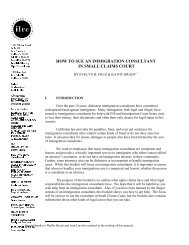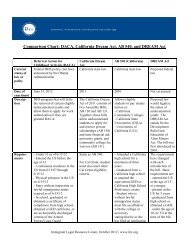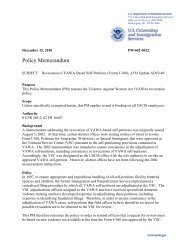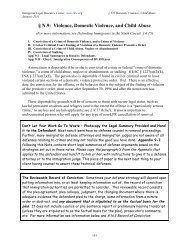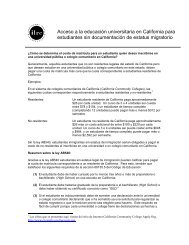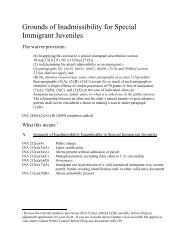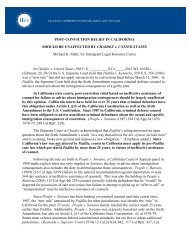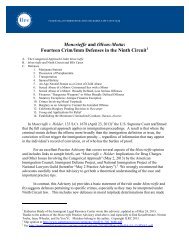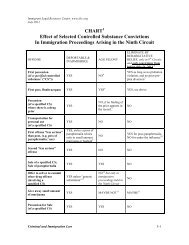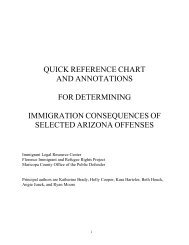quick reference chart and notes for determining immigration - ILRC
quick reference chart and notes for determining immigration - ILRC
quick reference chart and notes for determining immigration - ILRC
Create successful ePaper yourself
Turn your PDF publications into a flip-book with our unique Google optimized e-Paper software.
Cali<strong>for</strong>nia Quick Reference Chart <strong>and</strong> Notes<br />
February 2010<br />
G. Infractions<br />
Under some state laws certain minor offenses—sometimes called infractions—are<br />
h<strong>and</strong>led in non-conventional criminal proceedings that do not require the usual constitutional<br />
protections of a criminal trial, such as access to counsel, right to jury trial, etc. In Matter of<br />
Eslamizar 45 the BIA has held that this type of disposition will not be considered a conviction <strong>for</strong><br />
<strong>immigration</strong> purposes. This applies to both <strong>for</strong>eign <strong>and</strong> national dispositions. It appears that<br />
conviction of a Cali<strong>for</strong>nia infraction, in a proceeding that lacks the constitutional safeguards<br />
available in a misdemeanor prosecution, ought to be held not to be a conviction <strong>for</strong> <strong>immigration</strong><br />
purposes. However, there is no ruling yet on this issue, so this is not a guaranteed defense.<br />
In Eslamizar the BIA held that a conviction <strong>for</strong> <strong>immigration</strong> purposes is “a judgment in a<br />
proceeding which provides the constitutional safeguards normally attendant upon a criminal<br />
adjudication.” It found that a finding of guilt under an Oregon statute did not qualify based on<br />
several factors. The Oregon “violation” is not considered a crime since it does not result in any<br />
legal disability or disadvantage under Oregon law; there is no right to jury or counsel; <strong>and</strong> the<br />
prosecution only has to prove guilt by a preponderance of the evidence instead of beyond a<br />
reasonable doubt.<br />
In Cali<strong>for</strong>nia, as in Oregon, infractions are not considered “crimes.” The procedure in<br />
Cali<strong>for</strong>nia <strong>for</strong> prosecuting an infraction confers no right to jury or defense counsel <strong>and</strong> it is not<br />
punishable by imprisonment. 46 However, whereas Oregon only requires the prosecutor to prove<br />
a preponderance of the evidence, in Cali<strong>for</strong>nia the prosecutor must prove guilt beyond a<br />
reasonable doubt. 47 While <strong>immigration</strong> counsel have a strong argument that this difference<br />
ought not to be enough to distinguish a Cali<strong>for</strong>nia infraction from an Oregon violation under<br />
Eslamizar, 48 there is no guarantee that the courts or consulates will so rule. There<strong>for</strong>e while this<br />
is a reasonably good disposition, it is not guaranteed not to be a conviction.<br />
H. Appeal, Including Appeal after a Suppression Motion (“Slow Plea”)<br />
It has long been held that a conviction currently on direct appeal of right does not have<br />
sufficient finality to constitute a “conviction” <strong>for</strong> any <strong>immigration</strong> purpose. 49 While some<br />
circuits have found that 1996 legislation subverted this rule, in the Ninth Circuit it is clear that a<br />
conviction on direct appeal of right will not be held to constitute a conviction <strong>for</strong> <strong>immigration</strong><br />
purposes.<br />
45 Matter of Eslamizar, 23 I&N Dec. 684, 687-88 (BIA 2004).<br />
46 Calif. PC §19.6.<br />
47 Calif .P. C. § 19.7 (“all provisions of law relating to misdemeanors shall apply to infractions including … burden<br />
of proof.”).<br />
48 For more discussion on infractions, see Safe Havens, by Norton Tooby <strong>and</strong> J.J. Rollin, Chapter 4, § 4.11.<br />
49 Pino v. L<strong>and</strong>on, 349 U.S. 901, 75 S.Ct. 576 (1955) (holding that an “on file” system in Massachusetts did not<br />
constitute sufficient finality to be a basis <strong>for</strong> deportation under the Act).<br />
N-34 Immigrant Legal Resource Center



